
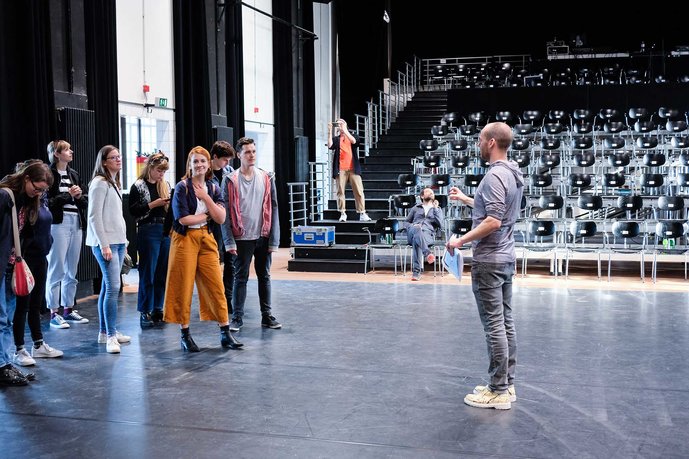

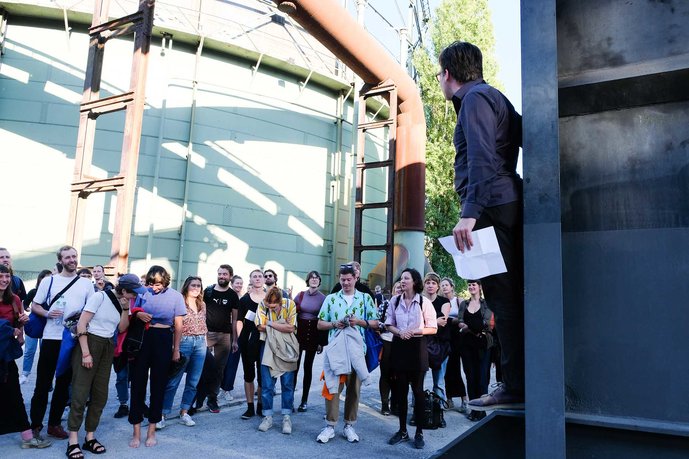

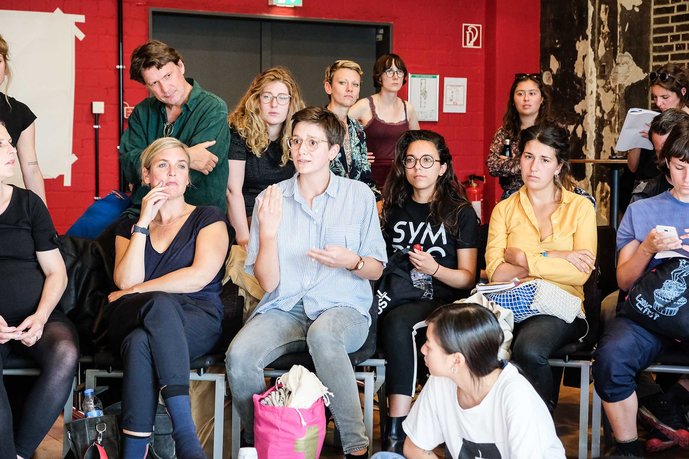

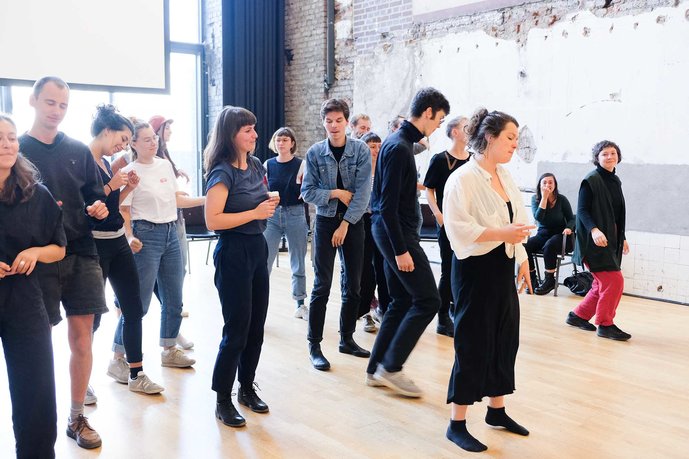

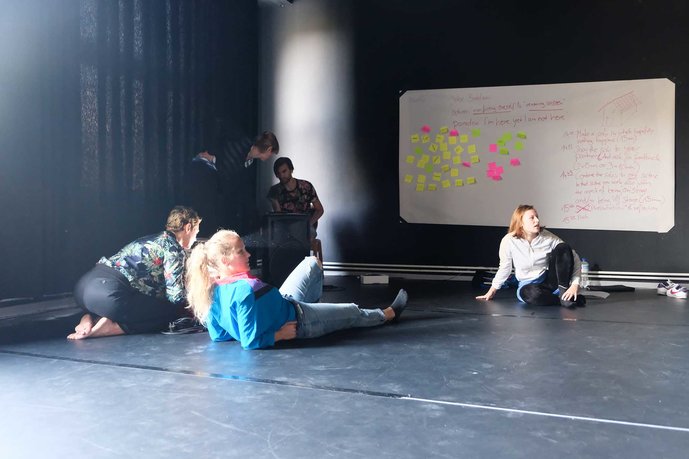

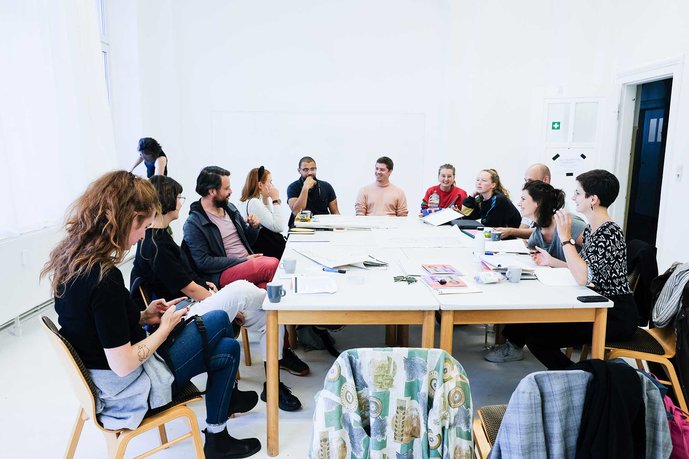

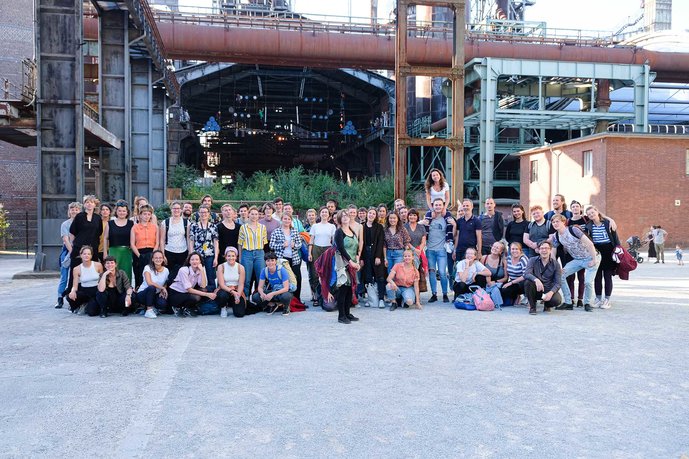

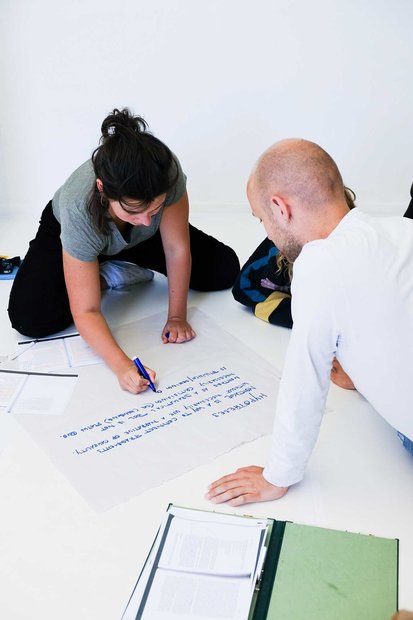
1 – Jules Buchholtz
MA Theatre Studies, University of Munich, Germany
The seminar concentrates on the reality-producing effect of scenario-induced foresight. The theatre has always been a practice of testing life in the ‘As-If’ and increasingly, once more, an instrument of knowledge transfer of socially relevant questions. It appears repeatedly in the centre of efforts to shape the future of society, inspired by the question: how do we want to live? It may serve as a laboratory for new forms of participation. It may be a ground for playing with new forms of living, of utopias, of transformation and new social concepts. The seminar therefore focuses on the function and significance of theatre and scenario in the anticipatory foresight of the future and the formation of opinion directed towards the future, guided by the question: How do we even know that we want to live like this?
Jules Buchholtz studied Philosophy, Applied Theatre Studies, Fine Arts and Performance at the Dartington College of Arts, in Heidelberg and Giessen. She is a member of the Graduate Centre for Cultural Studies in Gießen and lecturer at the University of Gießen and the University of Fine Arts Braunschweig. She lives and writes in Hamburg, where she works both theoretically and artistically with a focus on realism / reality, risk regime, speculative scenario technique and medical law. She is currently working as a guest lecturer at the MA department for Theatre Studies in Munich.
2 – Ekaterina Trachsel
Institute for Media, Theatre and Popular Culture, University Hildesheim, Germany
Since the days of the historical avantgardes ‘montage’, as a technique, stands for a dramaturgy which strongly deviates from an Aristotelian ideal. One can talk of a dramaturgy of fast transitions, contrast, and incompleteness. While in the 1920s, Sergej Eisenstein planned his “Montage of Attractions” in order to influence the audience politically, in the post-dramatic notion of ‘montage’ of the 1990s, the emphasis is on the individual and the free connection of disparate parts and fragments. In 2013, the anthropologists Christian Suhr and Rane Willerslev published their anthology with the title Transcultural Montage. There, various authors describe montage and its potential to ‘mind the gap’, the absence of subaltern speech and phenomena of discursive exclusion in general. The Ruhrtriennale 2019 strives to “[...] examine aspects of European self-criticism; this year artists address their own privileged European existences in diverse ways.” (Stefanie Carp). We will discuss the mise en scène of (self-)criticism in order to discover different strategies of montage and de-montage: Is (self-)criticism always a de-montage of seemingly static positions and structures? What are the gaps and fragments when observing a theatrical deconstruction of ‘European’ privileges? Examining the dramaturgical architectures of several performances, we are going to test the hypothesis, whether something like a ‘European Dramaturgy’ even exists. Do the performances we witness at Ruhrtriennale 2019 deconstruct (our idea of) a ‘European Dramaturgy’?
Ekaterina Trachsel studied Scenic Arts (B.A.) and Staging Arts and Media (M.A.) at the University of Hildesheim. Since 2017 she has been working there as a research assistant at the Institute for Media, Theatre and Popular Culture. She is doing her doctorate under Prof. Dr. Annemarie Matzke on the production and reception aesthetics of the process of disassembly in theatre. In addition to teaching and research, she is working as a freelance theatre maker with the theatre collective VOLL:MILCH and the interdisciplinary artists' collective MONSTER CONTROL DISTRICT (www.vollmilch.me).
3 – Sabine Harbeke & Stefanie Lorey
Directing, Zurich University of the Arts, Switzerland
What systems are theatre evenings and performances subjected to? How can an event be sorted and arranged? What agreements are there? What deviations? How do they become visible? How can they be obscured? What techniques are used to affect the audience and what methods can be used to prevent them? Which spatial constellations are decisive and determine the play? And what influence does decoding have on the aesthetic readability of the work? This course deals with agreements of (theatrical) play and (aesthetic) sets of rules. On stage. Between stage and auditorium. Between fictional and real space. And in everyday life.
On the basis of the performances and excursions visited together, appointments, sets of rules, laws, scores are examined, reflected upon and decoded. The participants will draft example sets of rules and develop aesthetic models which will be put to the test, experienced and discussed in simple experimental arrangements.
Sabine Harbeke is a swiss playwright and director. She studied Physical Education followed by Visual Communications at HGK Lucerne and Film Directing at SVA in New York. She lived and worked in New York where she wrote and directed short fiction films and a documentary about the Fulton Fish Market. Within those years she became a member of the "Playwright and Directors Unit" at the Actors Studio in New York and realized several projects. After returning to Europe her writing and directing has been commissioned by Thalia Theater in Hamburg, Theater Kiel, Theater Bonn, Theater Basel, Theater Neumarkt in Zürich, Theater Bern, Theater St. Gallen and Schauspielhaus Bochum. In 2016 she directed her own adaptation of "Medea" at the Teatr Muzyczny Capitol in Wroclaw collaborating with Piotr Dziubek. Her plays often evolve around the subject matter of current political situations interfering with the private and have been translated into several languages. Since 2009 she has been the head of BA Theatre Directing program at the ZHdK, working internationally as a guest lecturer.
Stefanie Lorey studied Applied Theatre Studies in Giessen. Since 2001, she has been working with Bjoern Auftrag under the label “Auftrag : Lorey” on projects that move between the borders of performance and installation art. Her works have been shown at the schauspielfrankfurt, the Wiener Festwochen, the Salzburger Festspiele, the Schauspielhaus Bochum, the Deutsches Theater Berlin, as well as in Caracas (Venezuela) and Johannesburg (South Africa). In 2017 she completed her doctorate on the concept of the Performative Collection.
4 – Hanne König
Exhibition Design and Scenography, University of Arts and Design, Karlsruhe, Germany
PART OF THIS WORKSHOP WILL BE THE EBOW / EBONY BONES CONCERT ON SUNDAY EVENING, SEPTEMBER 22ND AT RUHRTRIENNALE. THIS MEANS: ALL PARTICIPANTS OF THIS SEMINAR ARE INVITED TO STAY UNTIL MONDAY MORNING, SEPTEMBER 23RD, WHICH IS ONE NIGHT LONGER THAN THE REST OF THE FESTIVALCAMPUS GROUP. (ACCOMMODATION IS PROVIDED)
Feminist rap is booming. The progressive appropriation of this musical form of fast vocal delivery about contemporary "realities" and social structures is loud, radical and inexorable. As a rap battle against a fictitious opponent, its socio-political potential can be fulfilled. We approach this genre as amateurs – meaning nobody has to be able to rap; I can't do it either (unfortunately).
We examine some of the protagonists of the scene and listen to their songs: How are their texts written? What is the beat like? What is their dance style and their fashion style or even their costumes?
The setting or stage at a rap concert often give power to the audience, breaking through the fourth wall – the audience is addressed and integrated into the "communication". It acts as a sign of solidarity and can be understood in the context of empowerment.
Hanne König works conceptually and as a curator for exhibitions, engaging in dialog with artists on their works and with graphic designers on publications. She is an academic associate for curatorial studies and dramaturgical practice at the department of exhibition design and scenography at the University of Arts and Design in Karlsruhe. Over the last few years, she has investigated invisible (but not unseen) processes in the curatorial and choreographic work. Furthermore, she is interested in feminist science fiction and feminist collective practices.
5 – Jürgen Bruckner & Brechje Janssen
ArtEZ Academy for Theatre and Dance, Zwolle, Netherlands
This cooperative workshop will take an intensive look at two of the artists from the Ruhrtriennale's festival program and their respective artistic contexts: Dutch theatre maker Jetse Batelaan and Brazilian director Christiane Jatahy.
We will start working with physical and philosophical elements that will help us to examine different aspects of a specific direction of the Dutch (youth) theatre landscape and one of its most prominent representatives, Jetse Batelaan. Typical elements of this theatre form allow us to see and think differently and play with the expectations we have as viewers in a sophisticated way. We will work with fragments from Batelaan's production that we will see and throughout the first and second session try to create small scenes or images of our own, inspired by typical elements of this Dutch contemporary theatre 'language'.
In the third session, we will transform our format from a workshop to the frame of a seminar on Christiane Jatahy. We will try and illuminate her Odyssey diptych in direct comparison with the Odyssey adaptation of another Brazilian director, Leonardo Moreiras and his Compagnie Hiato, also created in 2018. What fascinations emanate from this Homeric material for contemporary South American directors? What opportunities and risks are hidden behind the change of media from sung or written epics to the theatre stage? In preparation for this session, Michel Foucault's relevant radio lecture "Other Spaces" should be read.
— (.....) A PIECE THAT DOESN’T GIVE A SHIT ABOUT IT’S VAGUE TITLE
JETSE BATELAAN
PERFORMANCE
A long time ago a singer with a lot of chest hair sang: “Is this the real life, is this just fantasy?” We think. We have our doubts. Fuck you! Why do we need to understand something that’s actually incomprehensible? And by the way that Queen song has no fuck to do with our play. It’s not included. It’s just an example. Or is that not allowed either? Are you going to moan at the box office afterwards that the blurb was wrong? Go on then. A lot of other things are wrong too.
— LOVE STORY CANDICE BREITZ
INSTALLATION / VIDEO
A version of Love Story by Candice Breitz, specifically conceived for the Ruhrtriennale 2019, will be performed over 4 days in Museum Folkwang:
Love Story interrogates the mechanics of identification and the conditions under which empathy is produced. Evoking the global scale of the refugee crisis, the work evolves out of lengthy interviews with six individuals who have fled their countries in response to a range of oppressive conditions: Sarah Mardini, who escaped war-torn Syria; José Maria João, a former child soldier from Angola; Mamy Maloba Langa, a survivor from the Democratic Republic of the Congo; Shabeena Saveri, an Indian transgender activist; Luis Nava Molero, a political dissident from Venezuela; and Farah Abdi Mohamed, a young atheist from Somalia.
The personal narratives shared by the interviewees are articulated twice by Love Story. In the first space of the installation, re-performed fragments from the six interviews are woven into a fast-paced montage featuring Hollywood actors Alec Baldwin and Julianne Moore. In a second space that is accessible only via the first, the original interviews are projected in their full duration and complexity. Suspending viewers between the gritty first-hand accounts of individuals who would typically remain nameless and faceless in the media, and an accessible drama featuring two actors who are the very embodiment of visibility, Love Story reflects on a media-saturated culture in which strong identification with fictional characters and celebrity figures runs parallel to widespread indifference to the plight of those facing real world adversity.
— TRAINING FOR THE FUTURE JONAS STAAL, FLORIAN MALZACHER PERFORMATIVE TRAINING CAMP
Training for the Future is a utopian training camp where audiences become trainees in creating alternative futures, learning how to decolonize society, how to use extraterritorial waters for political action, create new forms of encryption, enact intergenerational climate justice, socialize artificial intelligence and campaign transnationally. Futurologists, progressive hackers, post-national activists, trans-nationalists, theatre makers, artists, and many others offer concrete exercises in alternatives to the present-day crisis within a training installation developed by artist Jonas Staal, situated in the Jahrhunderthalle Bochum. It seems a consensus today, that what is ahead of us can only be imagined as a disaster. Training for the Future instead aims to collectively reclaim the means of production of the future.
Training for the Future offers fourteen trainings over the course of three days, participation is possible for the full curriculum or for each training individually.
— THE LINGERING NOW – O AGORA
QUE DEMORA OUR ODYSSEY 2
CHRISTIANE JATAHY
FILM / THEATRE / PERFORMANCE / GERMAN PREMIERE
This is about the complexity of being lost. The Brazilian director Christiane Jatahy gathered film material in Brazil, Greece, Lebanon, Palestine and South Africa. She will mix this documentary material with live narration by the evening’s participants. These are people from each location in which the production is performed, including actors. The merging of genres is the performance’s stylistic principle; the lack of a home and of a future its theme: the lingering now.